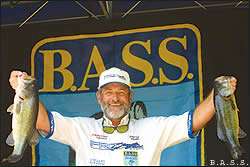
LAPLATA, Md. — There are times when a little information can go a long way. David Hall proved that during the 2002 Maryland CITGO BASSMASTER Open on the Potomac River Aug. 8-10.
After a poor practice in which he caught a few fish from only two areas on the Potomac River, the Pennsylvania pro opted to concentrate on those two apparently mediocre spots. But it paid off.
"The best thing I did all week was stay in those two areas and not run around to other spots," said the 54-year-old tire salesman. "It turned out that they produced more quality fish than I realized were there."
Especially on the final day of the tournament.
While the leaders were stumbling, Hall roared from fourth to first with a 16-pound, 2-ounce limit, giving him a three day total of 42-6 and nearly a 3-pound edge over Indiana's Ken McIntosh, who finished with 39-8. Jay Boettner of Enola, Pa., was third with 38-12, Chris Daves of Spring Grove, Va., was fourth with 37-9 and Wally Szuba, the second round leader, wound up fifth with 36-15.
Hall collected $15,000 cash and a bass boat package valued at $35,000 for his first place finish in the season opener of the Northern Division.
The final standings looked a lot different than the leader board did heading into Saturday when Szuba led; Curt Lytle of Suffolk, Va., was second; and Takahiro Omori of Emory, Texas, was fifth.
But Szuba blew an engine shortly after the launch, causing him to miss the critical morning bite, while Lytle and Omori struggled to catch fish.
"That goes to show you that anything can happen in one of these things," said McIntosh, who jumped from 10th to second. "That's why you should never give up."
Hall certainly didn't.
A two time BASS Masters Classic qualifier through the B.A.S.S. Federation ranks, the soft- spoken pro improved his catch each day and moved through the ranks inconspicuously. He started off in eighth with a five bass limit weighing 12-5, and he climbed to fourth with 13-15 on the second day.
And even he admitted to being surprised.
"I really didn't think I had a chance after seeing the big bags come in the second day," said Hall, who fished the B.A.S.S. Federation National Championships in 1994, 1997 and 1999. "But I knew the areas I fished had potential."
Like most of the field, he probed the weedbeds located along the main river. Veteran Potomac anglers say the river has had more grass this year than ever before, making it difficult for them to find the most prolific sections.
"The grass is great for the river, but it makes it difficult to find the key spots that hold the most bass," explained Hall, who caught all of his fish on a 3/8-ounce Terminator Spinnerbait.
Ironically, he was looking for a rockpile when he stumbled onto his best area.
"I never did find the rocks, but when I caught a couple 3-pounders there, I figured the place was worth fishing during the tournament since I didn't have much of anything else going," Hall remarked.
Both of his weedbeds were located in the Arkendale Flats area about 15 miles south of Smallwood State Park, where the daily weigh-ins were conducted. They were about a mile apart, with the key stretch covering a half-mile of water, while the other was about 400 yards long. One of them produced limits, while the other produced quality strikes.
He went to the smaller weedbed to get limits the first two days, then upgraded his catch on the larger weedbed where the bigger bass lived.
"I decided to start there (on Saturday) and caught three fish," he explained. "I ran to the other weedbed and caught three more. I went back to the quality spot and got a couple 4-pounders that really helped a lot."
Weather: After a prolonged period of hot weather, a cold front passed across the area during Tuesday's practice, and the wind blew out of the north at 15 to 25 miles per hour. The wind speed slowed to 10 and 15 mph the rest of the week and shifted to the southeast. Air temperatures dropped to the low 60s overnight and climbed to low 80s during the day, with afternoon highs approaching the 90 degree mark by Saturday. Skies remained clear throughout the three day tournament.
The section that produced more fish was along inside edges of grass that had scattered, open areas. He fished the outside edge on the quality fish spot, and in both places, worked his spinnerbaits slowly and methodically.
"Both areas looked like any other weedbed on the river, except the quality spot seemed to have deeper water (6 to 8 feet) on the outer edge," he described. "The big fish spot didn't get as much pressure, and the water was clearer because it was protected from wind and boat traffic."
As always on the Potomac, the tide was a big factor in fishing success. By drawing flights that were due in later each day, he was able to catch the rising and outgoing tides that helped keep bass active.
"Fishing was slow (on Saturday), but the bites I got were quality fish, and that enabled me to win," said Hall.
The Pennsylvania resident believes his lure presentation was important. The Terminator lure he used featured twin blades — a nickel-colored Oklahoma-style blade with a smaller Colorado ahead of it. It had a chartreuse/white skirt and he added a shad-colored twin-tail trailer and Owner trailer hook.
"I have so much success with that combination that I throw it everywhere I go," he explained. "I also fish it on a 6-foot rod (Shimano V Series with Shimano Calcutta reel and 17-pound-test Trilene XT line) because I can feel the bait much better on that outfit."
He set off the grass and would cast into the weeds, allowing the bait to flutter into the holes and along the edges. When it hit weeds, he would "rip" it free.
Feel was important, he noted, because not all of the bass crushed the lure.
"There were times I didn't feel anything, but the rod got heavy, and I knew to jerk," he explained.

